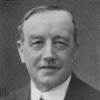Arthur Henderson

Arthur Henderson
Arthur Henderson PCwas a British iron moulder and Labour politician. He was the first Labour cabinet minister, won the Nobel Peace Prize in 1934 and, uniquely, served three separate terms as Leader of the Labour Party in three different decades. He was popular among his colleagues, who called him "Uncle Arthur" in acknowledgement of his integrity, his devotion to the cause and his imperturbability. He was a transitional figure whose policies were, at first, close to those of the Liberal...
NationalityBritish
ProfessionPolitician
Date of Birth13 September 1863
Arthur Henderson quotes about
Whatever we do or fail to do will influence the course of history.
In our modern world of interdependent nations, hardly any state can wage war successfully without raising loans and buying war materials of every kind in the markets of other nations.
In some states militant nationalism has gone to the lengths of dictatorship, the cult of the absolute or totalitarian state and the glorification of war.
Thus, the struggle for peace includes the struggle for freedom and justice for the masses of all countries.
We had four years of world war which the peoples endured only because they were told that their sufferings would free humanity forever from the scourge of war.
The nations must be organized internationally and induced to enter into partnership, subordinating in some measure national sovereignty to worldwide institutions and obligations.
As a first step there must be an offer to achieve equality of rights in disarmament by abolishing the weapons forbidden to the Central Powers by the Peace Treaties.
Perhaps the grimmest aspect of this great paradox is that the very nations that are chiefly responsible for starting and for maintaining the Disarmament Conference are also the nations that have begun a new arms race.
In almost every country there are elements of opinion which would welcome such a conclusion because they wish to return to the politics of the balance of power, unrestricted and unregulated armaments, international anarchy, and preparation for war.
The years of the economic depression have been years of political reaction, and that is why the economic crisis has generated a world peace crisis.
It is because I believe that it is in the power of such nations to lead the world back into the paths of peace that I propose to devote myself to explaining what, in my opinion, can and should be done to banish the fear of war that hangs so heavily over the world.
One of the first essentials is a policy of unreserved political cooperation with all the nations of the world.
The drive toward economic nationalism is only part of the general revival of nationalism.
The more the history of the World War and what led up to it is studied, the more clearly those tragic years become revealed as a vast collapse of civilization.